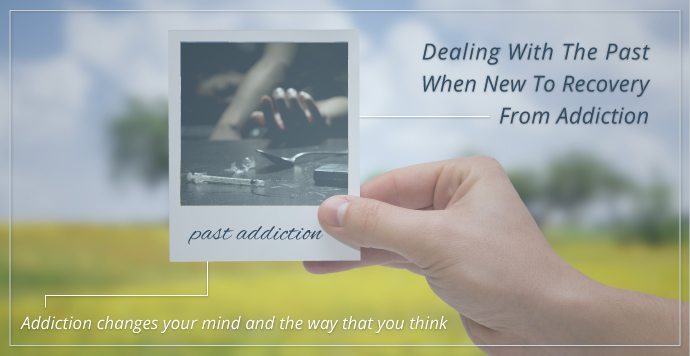The Past May Not Be Pretty
When suffering from addiction, there’s a good chance you’ve done things of which you’re ashamed. It’s hard to live any kind of life without doing something that is immoral and antithetical to your belief systems. Don’t feel like this makes you a bad person: I have done things which make me shake my head when I look back at them. So you’ve probably done things you shouldn’t have, treated people in painful ways, and burned bridges in months that had taken you decades to build. I’m not going to try to deny the fact that addiction probably made you behave in a way you never would have otherwise. But look carefully at that last sentence for the key to dealing with your past. Specifically, the phrase “never would have otherwise.” These words are crucial in dealing with your past. Why? They explain why you behaved the way you behaved and how recovery is a useful tool for eliminating those behaviors. No, it doesn’t excuse your behavior, but you can feel comfort in knowing you were acting out of character. During recovery, you will regain the clear-headed ability to spot poor behaviors and the strength to combat their influences. [inline_cta_one] And you can approach your past with a sense of personal honesty and integrity. The biggest part of your recovery is knowing that what you did was wrong and making amends for those behaviors. Understanding the wrongness of your behaviors shows that you are a good person, one that is capable of changing and adapting to negative situations. By making amends to those you’ve hurt in the past and dealing with the negative influences and results of your addiction, you can grow emotionally and spiritually. You will feel a great sense of relief as the weight of grief and guilt disappear. The veil of shame can be lifted and you can see yourself in a brand new glorious light.
Issues You’re Likely To Run Into
Everyone’s addiction is different and the problems of your past are likely to vary wildly from others. That’s okay because identifying these issues and concerns are a major part of your recovery. I’ve watched countless people struggle in this step because it brings up so many painful memories. However, I’ve also seen the look of relief and joy in their faces that comes when they realize they’ve successfully dealt with their issues and are on their way to a successful recovery. Personal honesty and integrity is, as always, crucial in this step. Examine your past and identify key issues that need to be addressed. Issues about your past in addiction that are likely to plague you during your recovery include:
- Problems with loved ones who feel betrayed
- Legal issues caused by your use
- Guilt over bad past decisions
- Psychological concerns that originally contributed to your addiction
- Decreased faith and trust from your loved ones
- Physical problems that make it hard for you to focus and think
Making amends for these behaviors is a complex and emotional process that I’ll discuss in more depth later. For now, it’s worth knowing that all these concerns CAN be solved in rehabilitation. With hard work and dedication, you can move beyond your painful past on your way towards improved personal health.
Understanding How Your Addiction Led To These Problems
Addiction changes your mind and the way that you think. Anyone who has recovered from addiction understands how they changed, but it’s vital to see how the changed aspects of your life led to your poor behavior in the past. Why? I believe that it helps you understand how much of your behavior was out of your control. No, you can’t use this as a metaphorical “get out of jail free” card, but you can use it as an inspiration for your continued recovery. It can help remind you of your true moral base and give you a guide through the difficult process of assessing your past. Let’s break down the ways addiction changes your mind in a step-by-step process:
- Using an addictive substance activates pleasure hormones in your brain.
- Through continued use you become dependent on substances to produce these hormones.
- Without these hormones, your mind and body start to feel literal physical pain.
- To beat that pain, your mind shifts your focus away from your normal concerns and ambitions and towards scoring and using.
- All other personal concerns, such as morals, relationships, careers, and dreams take a permanent backseat to getting the addictive substance.
When you reach step six, you are often in a very desperate stage of addiction. I have seen people in this stage who have lied, physically attacked loved ones, and even committed crimes in order to score and use. They knew, deep in their heart, that these behaviors were wrong, but they couldn’t help themselves: they were compelled to behave in dangerous and destructive ways. This is how addiction changes your behavior and it’s why your past is now so riddled with problematic situations. I implore you to feel no shame or excessive personal blame after making this realization; instead, you should work hard to make amends with your loved ones and deal with any other problems in the past to fuel your successful recovery.
How To Make Amends With Your Loved Ones
Dealing with concrete concerns, such as paying legal fines or finding a new job, are relatively simple ways to deal with your past. They must be done, but they don’t require the kind of emotional investment that comes of making amends to your loved ones. And yet, this is easily the most important step: it can help you regain a trusting and loving relationship with the people who matter the most in your life. I can’t promise that it will be easy and some people may claim that they’ll never again trust you. But I believe that there’s always hope, as long as you are willing to communicate with your loved ones and to truly mend fences. The method I’ve seen used the most is perhaps the simplest, yet most effective:
- Reach out to the person with whom you want to make amends.
- Set up a time where the both of you can sit down and talk in a safe environment.
- Confess your sins or offenses, holding nothing back, and taking absolute ownership of them.
- Listen to anything they have to say about how they feel and any circumstances you didn’t know. Apologize for these circumstances as necessary.
- Honestly and sincerely discuss the ways in which you plan on changing your life. Discuss your rehab, if necessary, and your dedication to sobriety.
- Don’t get angry or defensive if they start speaking back to you in an unsavory way. They may need to vent these angry feelings. Just accept them with grace and humility.
The one promise I can make you is that this process will be difficult for both of you and will require absolute concentration and honesty. However, I can also promise that successfully pulling it off will bring a great deal of joy to your life. It’s hard not to break down and cry when you’re once again standing in the arms of your loved one, forgiven, and ready to move onward to a promising future.
Get A Hold Of Us If You Need Help
Hope is a present you must wrap and give to yourself and opening it up by dealing with the circumstances of your past can guide you towards recovery. And we can help. At Texas Recovery Center, we possess the vital guidance you need to help deal with your past in a healthy manner as you recover from addiction.












